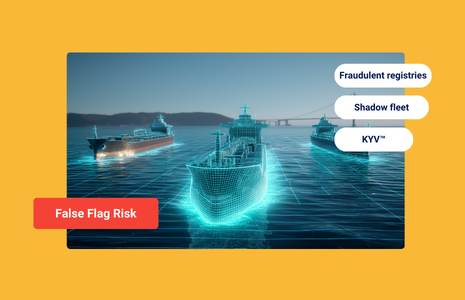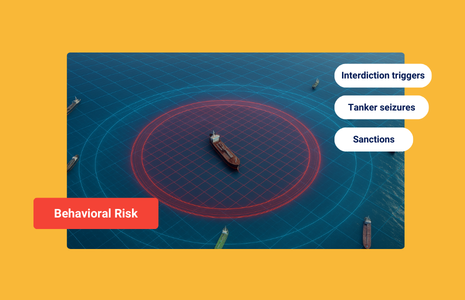The Epicenter of Maritime Lawlessness on Asia’s Doorstep

What’s inside?
For the past five years the waters off eastern Malaysia near the Riau archipelago have been used by ‘dark fleet’ tankers as a hub for floating storage and ship-to-ship transfers of Western-sanctioned oil.
The area is strategically convenient, serving as a mid-way point between Iran, Russia or Venezuela and China, the biggest buyer of crude, with nearby maritime services from Singapore, Malaysia or Indonesia within a day’s sailing.
This offshore hub has now evolved into an epicenter of lawlessness adjacent to the Singapore Strait.
The area is harboring sanctioned tankers lacking insurance, flag registration, or valid safety and seaworthiness certificates. Many of which are evading detection and inspection while engaging in illicit and deceptive shipping practices.
Widespread dark activity and GNSS manipulation is now a significant navigational hazard near international maritime lanes used by hundreds of vessels daily.
Daily Transfers of Sanctioned Crude Conducted Under Cover of Darkness
Millions of barrels of crude are illicitly transferred between tankers in Riau archipelago each day, often with ships’ Automatic Identification Systems switched off to obscure the origin and destination of the cargo.
As many as 80 sanctioned or high-risk tankers operate in this hub at any given time. Nearly 40% of them transmit false or unknown flags.
These ships undermine the global integrity of international trade and threaten the rules-based order of the maritime domain.
Windward Maritime AI™ analyzed a subset of tankers over 50,000 DWT — including medium-range tankers to very large crude carriers — operating in the area over a 30-day period ending July 28. Activity included anchorage, dark operations, ship-to-ship transfers, and location (GNSS) manipulation.
A total of 239 tankers over 50,000 DWT were identified. Of these:
- 108 tankers were sanctioned, with an additional 62 classified as high-risk due to various deceptive shipping practices.
- 28 tankers, averaging 21 years in age, engaged in dark activity. Of these, 82% were sanctioned by Western regulators and 36% were falsely flagged.
- 14 tankers were involved in location (GNSS) manipulation, with nearly 80% under sanctions and 57% transmitting false flags.
- 52 tankers conducted ship-to-ship transfers, 75% of which were either sanctioned or assessed as high risk in the region.
Although the waters where these tankers congregate lie beyond Malaysia’s territorial seas, they fall within its Exclusive Economic Zone (EEZ). While foreign-flagged vessels may navigate the area, they are prohibited from conducting unauthorized economic activities (such as ship-to-ship transfers). These maritime laws are being openly flouted.
At least three falsely flagged or U.S.-sanctioned tankers were tracked sailing from this hub into Malaysian or Singaporean territorial waters during the 30-day period.
Patterns and brief port stays — often 12 hours or less — suggest the vessels were stopping to pick up supplies or conduct crew changes.
One falsely flagged tanker was tracked to a shipyard in Singapore. Another entered Indonesia’s territorial waters before initiating location (GNSS) manipulation.
OFAC Targets Regional Enablers of Sanctioned Oil Trade
Avoiding these high-risk vessels has become increasingly urgent as U.S. regulators intensify scrutiny of local entities supporting sanctioned oil movements tied to Iranian trade.
The risks to service providers are rising. Since March 2025, the U.S. Treasury’s Office of Foreign Assets Control (OFAC) has imposed sanctions on:
- A Malaysian oil trader
- Indonesian tug operators involved in ship-to-ship transfers
- A Singapore-based company that provided cargo inspection and certification services
OFAC has made clear that any company involved—directly or indirectly—in facilitating the trade or transport of sanctioned oil may face enforcement action.
Falsely flagged tankers loitering off the Riau Archipelago were found using fraudulent registries, including Aruba, Benin, Curaçao, Eswatini, Malawi, Guinea, Guyana, and St. Maarten.
Malaysia plans to introduce new regulations on July 31 banning unauthorized STS oil transfers in its EEZ. Vessels that fail to secure prior permission will be detained, according to a July 12 report.
The move follows public remarks by Malaysia’s Foreign Minister at the ASEAN Foreign Ministers’ Meeting, signaling a shift toward stricter enforcement.
Trending
- The EU’s 18th Sanctions Package Lookback Started. Trading Russian Products? You're At Risk. Nov 24, 2025
- Tanker Freight Rates Hit Five-Year High Amid Russian Oil Sanctions Shake-Out Nov 6, 2025
- Sanctioned, Stateless, and Still Sailing: Expert Insights from the Frontlines of Maritime Sanctions Nov 3, 2025











